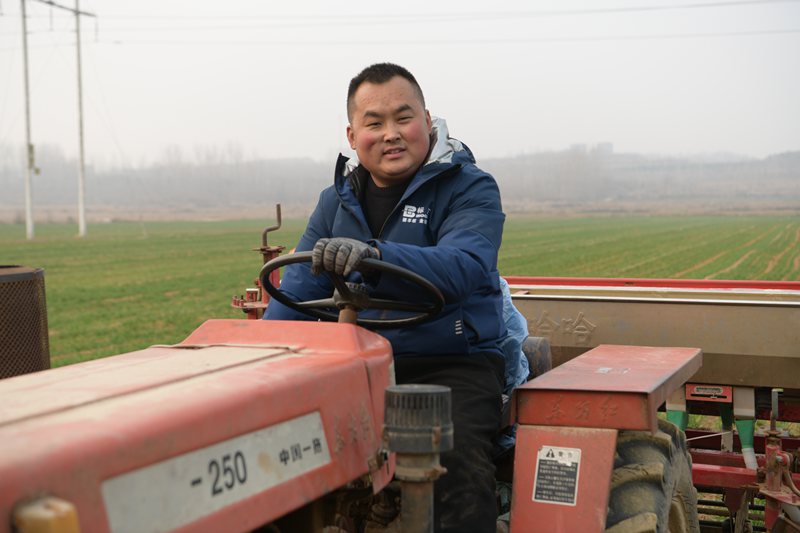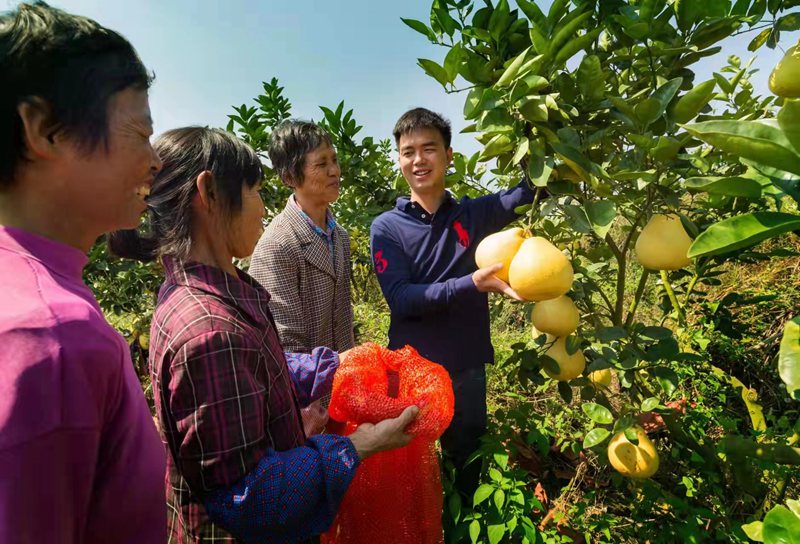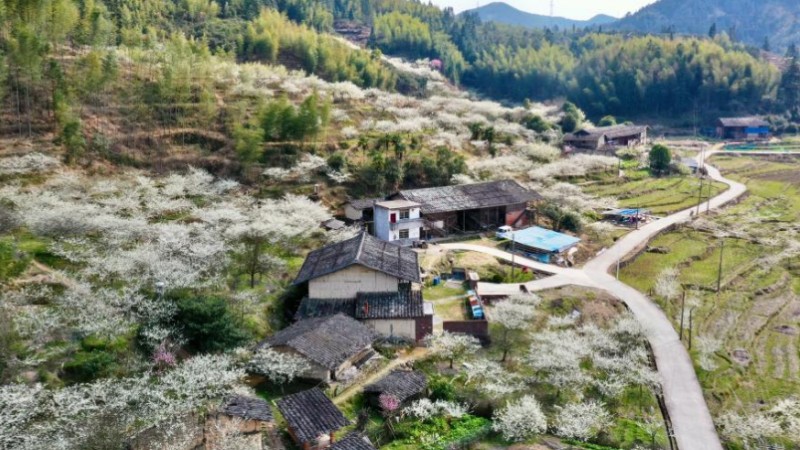Favorable policies, support see surge in talent to China’s rural areas
Entrepreneurship and innovation is on the rise in rural areas of China as cities across the country have intensified efforts to optimize the local environment for entrepreneurship and innovation, improve policies, and strengthen support to attract talent for rural vitalization.
The arrival of more talent has further promoted the aggregation of various other factors of production, such as capital and technology, continuously broadening the space of employment and channels for increasing farmers' income in rural areas.

Zhou Gaoliang, driving his own tractor, works in the field. (Photo/People's Daily)
Zhou Gaoliang, a college graduate who returned to his hometown to take up mechanized farming, now runs a family farm with an annual output value of more than 2 million yuan ($290,600) in Mengjin district, Luoyang city, central China's Henan Province.
"When I graduated from college, I told my father I wanted to start my own business in my hometown. My father, who has worked in the fields all his life, told me to think twice before deciding. He was afraid I couldn't bear the toilsome farm work," Zhou said, explaining that the decision to return to his hometown was the result of careful consideration, rather than a sudden impulse.
Zhou acquired the land-use rights of more than 800 mu (53.33 hectares) of farmland in his hometown, and learned to operate and maintain agricultural machinery on his own, and has motivated his fellow villagers to try mechanized farming.
He bought more than 30 pieces of agricultural machinery, including tractor, harvester, and unmanned aerial vehicles (UAV).
"The government provides subsidies for people who buy agricultural machinery. I believe mechanized farming must be profitable. I can also use my machinery to provide services to my fellow villagers," Zhou said.
While a man can only spray pesticides on 10 mu of crops at most a day, a UAV can handle the job for several hundred mu of land per day, according to Zhou, adding that UAVs can also save water and pesticides needed for the land and reduce the cost of pesticide spraying by a few dozen yuan per mu.
Zhou has also applied formulated fertilization based on soil testing, the integration of water and fertilizer, and many new technologies, which made the grain produced by his family farm popular with flour mills, and encouraged more and more of his fellow villagers to seek help and services from him.
Zhou has served as the "farmland nanny" who tends crops for many local farmers, with his agricultural machinery providing services to nearby villages. He has also been recognized as one of the top 10 people who have helped and led others in pursuing prosperity.
Luoyang city has included talent cultivation for rural areas into its general plan for work related to talent, and implemented projects to introduce and cultivate agricultural sci-tech talent and high-quality farmers, according to He Wei, a member of the Standing Committee of the Communist Party of China (CPC) Luoyang Municipal Committee.
The city has established 12 innovation platforms and six provincial-level demonstration bases for the cultivation of skilled talent for rural vitalization, training more than 5,400 high-quality farmers, He said.
Yongxin county in Ji'an city, east China's Jiangxi Province has also innovated its talent introduction mechanism in recent years. The county has provided support in finance, technology, and land use for outstanding entrepreneurs, college graduates, ex-soldiers, migrant workers and other people who return or go to rural areas of the county to start their own business and make innovations.
The county has attracted more than 1,000 such talent, who have established 342 specialized farmers' cooperatives and 186 family farms. More than 27,000 local villagers have become members of these cooperatives and farms.

Wen Lianglai (first from right) guides the farmers to pick honey pomelos. (Photo/People's Daily)
Wen Lianglai, a young man who used to operate a small factory in Shenzhen city, south China's Guangdong Province, was attracted to Gaoshi township, Yongxin county, to grow honey pomelo trees.
"Honey pomelo is a famous specialty of Ji'an city. The local government has offered favorable policies for entrepreneurs, and I had always wanted to return to my hometown to start a business," said Wen, who set up an agricultural company in Gaoshi township and planted more than 80,000 honey pomelo trees 10 years ago.
Wen's entrepreneurial journey hasn't been all smooth sailing. In the winter of 2013, most of the saplings in his honey pomelo planting base froze in the cold weather, which led to a loss of more than 1.5 million yuan, according to Wen.
Besides the huge loss, he also encountered other problems, including difficulties selling due to a lack of planning and an understanding of changes in the market, Wen recalled, saying that he was so frustrated in his business and even thought of giving up.
"You need to stick to your guns to see your efforts pay off in the agriculture sector. You carry on with your business, and we'll solve the problems together," an official of Yongxin county told Wen. These words strengthened his confidence.
Following the conversation with the official, Wen received support from the government in various aspects of his business, including the use of manpower and land, selection of tree varieties, development direction and overall planning.
A special agro-technician was sent to provide targeted assistance to Wen, and he also enjoyed favorable policies and received help applying for support funds and projects, and settlement of conflicts.
Thanks to the strong support, Wen's orchards have been continuously upgraded. He also built cold storage facilities with a capacity of 1,000 cubic meters to store honey pomelos for off-peak sales, established a mini rail-based transport system to save on manpower, and introduced intelligent devices to measure the sugar content of pomelos, sort the products according to their size, and identify rotten fruit.
In the past two years, Wen's orchards have had a total output value of more than 14 million yuan.
Wen's success has encouraged the local families to grow pomelo trees. The orchards have not only increased their income, but also improved the ecological environment of the locality.
Wen has been providing free saplings and training in relevant agricultural techniques to local villagers, and has been buying their pomelos at market price. He paid villagers more than 6 million yuan in dividends, and elderly people who work for his orchards 2.6 million yuan in wages on average a year.
"After the report to the 20th National Congress of the CPC stressed advancing rural vitalization across the board, more young people have returned to rural areas to start their own business and make innovations," Wen said.
Based on his pomelo business, Wen plans to build a pastoral complex featuring the integration of eco-friendly farming, outdoor exercises, and rural B&B hotels, thus increasing the income of more villagers.
There are numerous such examples in China as more young talent are flocking to the rural areas of the country to realize their potential.
According to an official at China's Ministry of Agriculture and Rural Affairs, 12.2 million people returned or went to the rural areas in the country to start businesses between 2012 and 2022.
With the country making efforts to continuously deepen rural vitalization, improve conditions for agricultural production in rural areas, and various talent, including college graduates, migrant workers, and entrepreneurs, using their abilities in rural areas, the country is expected to see the expansion in income from rising employment and avenues to further increase earnings, said the official.
Photos
Related Stories
- Rural China gains renewed vitality as economy rebounds
- Support rallied to aid battle against COVID in rural areas
- Tap water coverage in rural China to reach 88 pct
- District in N China provides medical services for rural residents
- Young Chinese building careers in rural areas
- Village doctors can improve hypertension control in rural China: study
- Xi stresses modernizing rural areas
- Postgraduate students help vitalize rural areas in SW China’s Guizhou province
- Returnees to rural areas prosper in China: newspaper
- Rural scenery in China's Gansu
Copyright © 2023 People's Daily Online. All Rights Reserved.









